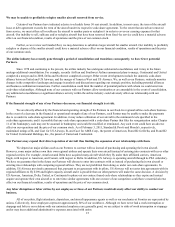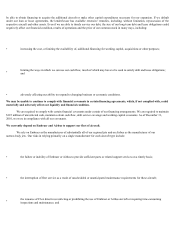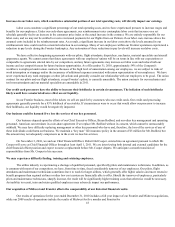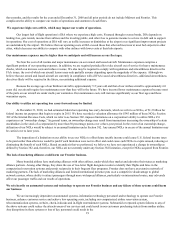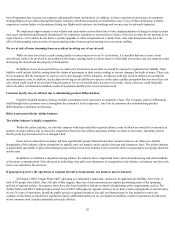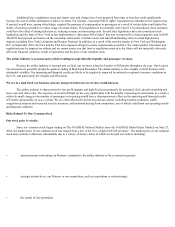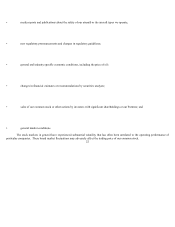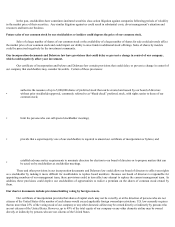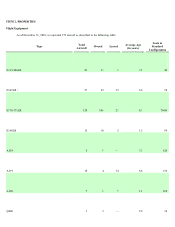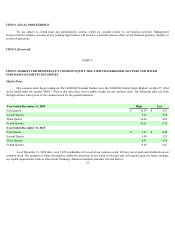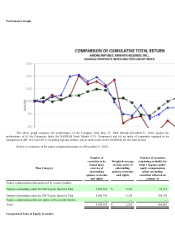Frontier Airlines 2010 Annual Report Download - page 29
Download and view the complete annual report
Please find page 29 of the 2010 Frontier Airlines annual report below. You can navigate through the pages in the report by either clicking on the pages listed below, or by using the keyword search tool below to find specific information within the annual report.High fuel costs would harm the airline industry.
A return to higher fuel prices would harm the airline industry's financial condition and results of operations. Fuel costs constitute a
substantial portion of the total operating expenses of the airline industry. Historically, fuel costs have been subject to wide price fluctuations
based on geopolitical issues, supply and demand and other factors. Fuel availability is also affected by demand for home heating oil, gasoline
and other petroleum products. Because of the effect of these events on the price and availability of fuel, the cost and future availability of fuel
cannot be predicted with any degree of certainty. Further, in the event of a fuel supply shortage or further increases in fuel prices, a
curtailment of scheduled service could result.
The airline industry has been subject to a number of strikes, which could affect our business.
The airline industry has been negatively impacted by a number of labor strikes. Any new collective bargaining agreement entered
into by other carriers may result in higher industry wages and increase pressure on us to increase the wages and benefits of our employees.
Furthermore, since each of our Partners is a significant source of our operating revenues, any labor disruption or labor strike by the
employees of any one of our Partners could have a material adverse effect on our financial condition, results of operations and the price of
our common stock.
Airlines are often affected by certain factors beyond their control, including weather conditions, which can affect their operations.
Generally, revenues for airlines depend on the number of passengers carried, the fare paid by each passenger and service factors,
such as the timeliness of departure and arrival. During periods of fog, ice, low temperatures, storms or other adverse weather conditions,
flights may be cancelled or significantly delayed. For example, in early 2010, winter storms throughout the country forced us to cancel an
abnormal portion of our operations. Under our fixed-fee code-share agreements, our regional airline business is partially protected against
cancellations due to weather or air traffic control, although these factors may affect our ability to receive incentive payments for flying more
than the minimum number of flights specified in our code-share agreements. Should we enter into pro-rate revenue sharing agreements in the
future our regional airline business will not be protected against weather or air traffic control cancellations and our operating revenues could
suffer as a result. Our branded operations are not insulated against weather or air traffic control cancellations.
Future economic recessions could result in weaker demand for air travel and may create challenges for us that could have a material
adverse effect on our business and results of operations.
Demand for air travel could weaken in an economic recession. Economic weakness in the United States and international economies
could have a significant negative impact on our results of operations.
The airline industry is heavily regulated.
Airlines are subject to extensive regulatory and legal compliance requirements, both domestically and internationally, that involve
significant costs. In the last several years, the FAA has issued a number of directives and other regulations relating to the maintenance and
operation of aircraft that have required us to make significant expenditures. FAA requirements cover, among other things, retirement of older
aircraft, security measures, collision avoidance systems, airborne wind shear avoidance systems, noise abatement, commuter aircraft safety
and increased inspection and maintenance procedures to be conducted on older aircraft.
We incur substantial costs in maintaining our current certifications and otherwise complying with the laws, rules and regulations to
which we are subject. We cannot predict whether we will be able to comply with all present and future laws, rules, regulations and
certification requirements or that the cost of continued compliance will not significantly increase our costs of doing business.
The FAA has the authority to issue mandatory orders relating to, among other things, the grounding of aircraft, inspection of aircraft,
installation of new safety related items and removal, replacement or modification of aircraft parts that have failed or may fail in the future. A
decision by the FAA to ground, or require time consuming inspections of or maintenance on, all or any of our Embraer or Airbus aircraft, for
any reason, could negatively impact our results of operations.
In addition to state and federal regulation, airports and municipalities enact rules and regulations that affect our operations. From
time to time, various airports throughout the country have considered limiting the use of smaller aircraft, such as Embraer or Bombardier
aircraft, at such airports. The imposition of any limits on the use of Embraer or Bombardier aircraft at any airport at which we operate could
interfere with our obligations under our code-share agreements and severely interrupt our business operations.
21





